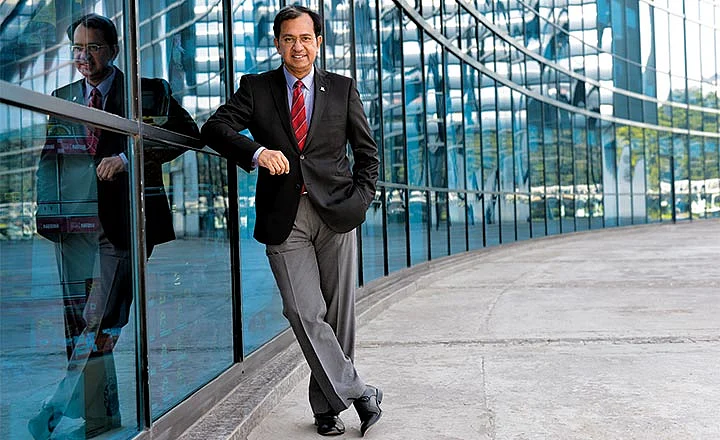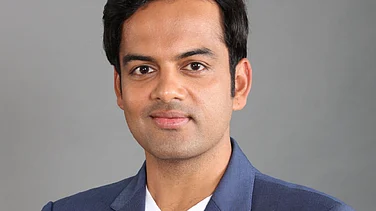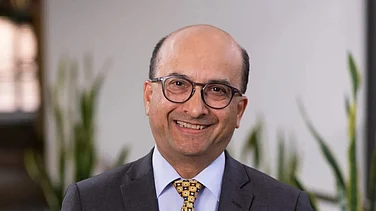E-commerce makes up about 8% of Nestle India’s overall business, while quick commerce accounts for 60% of online sales, according to Suresh Narayanan, the managing director of Nestle India.
Narayanan says quick commerce has become an important growth driver as more consumers prefer faster deliveries.
However, he is wary of the sector's financial sustainability, as it is heavily dependent on scale.
In an interaction with Outlook Business on the sidelines of a summit in Delhi organised by the Great Lakes Institute of Management, Narayanan discusses the impact of commodity inflation on profits, outlines a cautious pricing strategy, notes that headline inflation is now lower, and speaks about the growing contribution of quick commerce, among other insights.
You reported a 5.2% decline in net profit, so could you walk us through the factors that contributed to this drop?
See, the operating environment has been quite challenging, especially due to commodity inflation. Coffee is at 50-year highs, cocoa is at all-time records, wheat prices have been relatively high, and while oil prices have been stable, they too remain fairly elevated. Overall, commodity inflation has been in double digits for the business.
This level of inflation could not be fully mitigated by the company through cost efficiencies, recipe optimization, or other measures, and therefore, price increases had to be implemented.
As a result, volume growth has been muted, and overall revenue growth has been around 3–4%, which is lower than the double-digit growth we had seen over the previous 8–9 years.
With regard to the overall scenario, are you planning to increase commodity prices?
Now looking at the near term, we can't take a very long term view on commodities. In the near term, I think coffee prices are now tending to stabilise, albeit at a high level, but they are stabilising.
Wheat might actually surprise us, as the Rabi crop has been very good, and the Kharif crop is also expected to be strong. With such robust output, we could see some softness in prices.
Milk prices are relatively stable. Cocoa remains high, but our dependence on cocoa is lower compared to most other companies. So, I don’t foresee significant commodity inflation for the remainder of the period. There might be some selective price increases, but they should be quite nominal.
Are you thinking about selective price increases?
No, we will wait and watch, we have taken some price increases, we will wait and watch and see how it pans out.
Urban consumption is slowing down compared to rural consumption. Did it have an impact on your business or operations?
Look, I think rural consumption is relatively stable. Urban consumption is now improving as food inflation is coming down. Overall headline inflation is also lower, and as a consequence, along with the tax relief provided to middle-class consumers by the Honourable Finance Minister, we hope this will translate into higher disposable income in the new financial year. That, in turn, should result in a bit more money in consumers’ wallets, enabling increased spending.
How significant is the contribution of quick commerce platforms for you?
E-commerce accounts for about 8% of our total business, and quick commerce contributes 60% of that e-commerce portion.
Do you believe that they can evolve into a viable profitable channel for the company?
It remains to be seen. Today, it’s a consumer destination, and that’s why we are part of it. I believe it’s a technological and infrastructure miracle that deliveries can be made in 8 to 10 minutes and it’s truly unique. Currently, e-commerce companies are clearly not profitable, but it’s a scale game. If the scale grows significantly and unit operating costs come down, this could become a sustainable model. As of now though, it’s not sustainable—it’s being funded.
You are talking about both e-commerce and quick commerce here, right?
See e-commerce is kind of waning now, because quick commerce is now becoming the order of the day, so most of the e-commerce business is moving towards quick commerce.
Are you also planning to increase your focus on quick commerce rather than e-commerce right now?
We already have a fairly strong presence and no bias toward any specific channel. Each channel receives trading terms based on its salience and the importance consumers assign to it. Today, e-commerce, particularly quick commerce, is gaining more significance, and we are actively part of that journey.
There was a recent concern about high sugar levels in Cerelac. While the government has confirmed it meets food standards, what steps are you taking now to rebuild consumer trust?
Look, I’d like to make two points. First, the product we had in the past was fully compliant with FSSAI standards, as confirmed by the Honourable Health Minister in Parliament. So, it’s not a case of non-compliance.
Second, we have already introduced no-refined-sugar variants of Cerelac and Ceregrow in the market, and the response has been encouraging. There's a lot of ongoing information and education in the media about the importance of good nutrition, balanced diets for growing children, and complementary feeding. We're working closely with healthcare practitioners and engaging with consumers on social media to raise awareness and build trust. Hopefully, this will guide informed consumer choices.




























